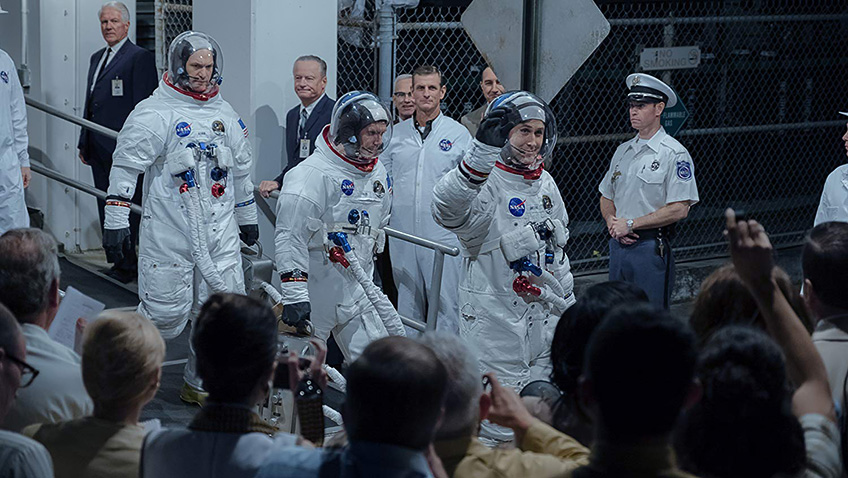Robert Tanitch reviews the latest DVDs
First Man (Universal). A chronicle of the Apollo II mission in 1969 is seen through the eyes of Neil Armstrong, the first man to walk the moon. Damien Chazelle’s docudrama hones in on the understated heroism, the strain on his marriage and the death of his 2-year-old daughter. The film, intimate, cerebral and visceral, is an immersive experience. You will feel what it is like to be in the rotating capsule: the claustrophobia, the rattling, the shaking and the danger. The only surprise is there no shot of putting the American flag on the moon. Ryan Gosling, introspective and stoic, keeps Armstrong’s emotion firmly under wraps. Claire Foy, playing his his wife is allowed to show her emotions. The story is gripping and moving.
The Hate U Give (20th Century Fox) is about race relations in the USA. An unarmed black teenager, driving a car, accompanied by a girl he has known since they were five, is shot dead by a white police officer. You can see why he did it. He thought the boy had a gun and was jittery. The girl saw it happen and the onus is on her to do something when the police officer is not charged. George Tillman Jr’s film concentrates on the girl and her relationship with blacks and whites. She lives in a black neighbourhood and goes to a posh white school. There is a terrific performance by the 20-year-old Amandla Stenberg, a major turning point in her career, and strong support from Russell Hornsby and Regina Hall as her parents. Black lives matter.
Human Desire (Eureka). This 1954 film noir is Fritz Lang’s remake of the Jean Renoir/Jean Gabin French classic, La Bete Humaine and it is not nearly as good. “It’s not love,” shrieks the poster. “It’s human desire!” Can Gloria Grahame (wife) persuade Glenn Ford (lover) to murder Broderick Crawford (husband)? The melodrama is not raw enough. The actors are upstaged by the railroad and the train which have a documentary reality. The wife role (“born to be bad and make trouble”) was intended for Rita Hayworth but she wouldn’t have been right either.
Dawson City: Frozen Time (Second Run). 513 silent films and old newsreels were buried under a swimming pool are discovered decades later – a veritable treasure trove, a useful window into the past. Bill Morrison’s documentary records the birth of Dawson City in Yukon during the Gold Rush in 1896 which coincided with the birth of the cinema. The nitrate negatives cause Dawson City innumerable fires over a long period. There is much destruction and reconstruction. There is no voiceover. The captions are superimposed on the film. There are tantalising images of the Ludlow Massacre and the scandalous cheating in 1919 baseball World Series. Morrison makes connections between clips from the 1910s silent fictional films and historical facts.
Stranger in the House (BFI) is a 1967 British film based on a novel by Georges Simenon. James Mason plays a drunken, limping, cynical barrister whose glory days are long over. His estranged hippie daughter (Geraldine Chaplin) reluctantly asks him to come out of retirement to defend her immigrant boyfriend who is accused of murder. Pierre Rouve’s script, based on a story by Georges Simenon, is terrible. The flashbacks, poorly acted, are very boring. The fights are extremely unconvincing. Mason, a fine actor, not surprisingly, acts everybody off the screen; but the barrister’s deliberate non-performance in court is as irritating as it is absurd. Mason didn’t think the film worked.
To learn more about Robert Tanitch and his reviews, click here to go to his website









